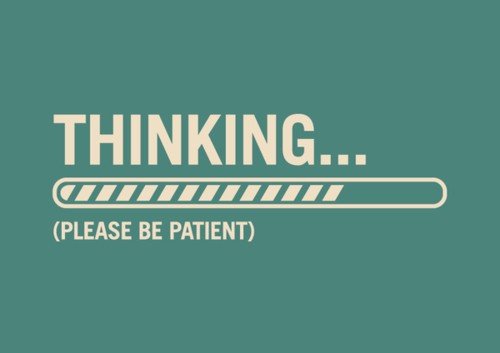
A reader sent in the following quote found somewhere on Facebook: “Funny thing is that social psychology research says that the more you think things through, the less logical your action — gives you too much time to rationalize.”
It’s a provocative thought.
One implication seems to be: Don’t think. Or more likely: Don’t think too much.
But how much thinking is ‘too much’? There cannot be an arbitrary quantitative limit. ‘3.5 hours of thinking a day maximum.’ That’s ridiculous, obviously.
So what’s the standard? I hear this from people a lot. ‘I think too much,’ they say—or they say they’re told that, by others. But when you’re told this by others, all it means is you’re thinking too much for them, or maybe they don’t like what you’re thinking. Others cannot be the standard.
Rather than get caught in this ‘thinking too much’ trap, I prefer to look at a phrase from economics: the law of diminishing returns.
On Wikipedia I found the following: ‘In economics, diminishing returns (also called diminishing marginal returns) is the decrease in the marginal (per-unit) output of a production process as the amount of a single factor of production is increased, while the amounts of all other factors of production stay constant.’
Basically, this means that the more you produce, the more output you get—but only to a certain point.
Since all economic production is, at its root, generated by human thinking, it stands to reason that this same principle applies to thought.
In other words: The more you think, the better off you’ll be—to a point. If you exhaust yourself thinking without generating conclusions, you haven’t served any purpose. If you think so much that you have no time to take action—or to experiment, to test your hypothesis, or to put your ideas into practice—then you’ve undercut the basic human need to utilize both theory and practice.
Yet there’s more—and this quote gets to it, which is why I like it.
There’s a qualitative aspect. In other words, HOW you think is hugely relevant. There’s something called rationalization. Rationalization is pseudo-thinking. It’s going through the motions of reason and logic, while leaving out important factors that might lead to a different conclusion.
Rationalization is mentally toxic—sometimes even physically lethal. It fuels so many things that human individuals do to undercut or even destroy their own well-being. Addiction comes to mind. Practices of deception or theft come to mind. Political authoritarianism/dictatorship—sadly, the norm of human history—come to mind as well.
Rationalization (and evasion) sank the Titanic. It also got us Nazi Germany. Find any serious or tragic error in human events, and you’ll always find rationalization somewhere near the root of it (evasion usually the ultimate cause).
Strictly speaking, it’s not true that ‘the more you think, the less logical your action.’ Not if you’re truly thinking. We cannot blame logic—which Ayn Rand defined as the practice of noncontradictory identification—on the failings for which only errors in logic (or evasions, rationalizations) can be responsible. You cannot blame non-thinking, or errors in thinking, on ‘too much thinking.’
Whoever said this (and I don’t know the author) hit on an important truth, but didn’t get it quite right. But understood in the right context, I still like the quote because it brings to light where many people go wrong, whether as societies or in simple everyday life.
Be sure to “friend” Dr. Hurd on Facebook. Search under “Michael Hurd” (Rehoboth Beach DE). Get up-to-the-minute postings, recommended articles and links, and engage in back-and-forth discussion with Dr. Hurd on topics of interest.
